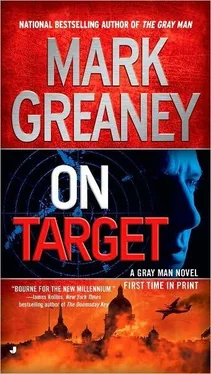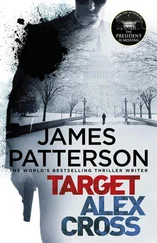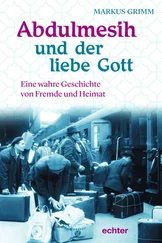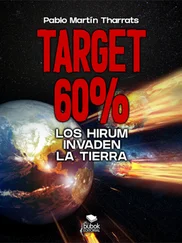Mark Greaney - On target
Здесь есть возможность читать онлайн «Mark Greaney - On target» весь текст электронной книги совершенно бесплатно (целиком полную версию без сокращений). В некоторых случаях можно слушать аудио, скачать через торрент в формате fb2 и присутствует краткое содержание. Жанр: Триллер, на английском языке. Описание произведения, (предисловие) а так же отзывы посетителей доступны на портале библиотеки ЛибКат.
- Название:On target
- Автор:
- Жанр:
- Год:неизвестен
- ISBN:нет данных
- Рейтинг книги:3 / 5. Голосов: 1
-
Избранное:Добавить в избранное
- Отзывы:
-
Ваша оценка:
- 60
- 1
- 2
- 3
- 4
- 5
On target: краткое содержание, описание и аннотация
Предлагаем к чтению аннотацию, описание, краткое содержание или предисловие (зависит от того, что написал сам автор книги «On target»). Если вы не нашли необходимую информацию о книге — напишите в комментариях, мы постараемся отыскать её.
On target — читать онлайн бесплатно полную книгу (весь текст) целиком
Ниже представлен текст книги, разбитый по страницам. Система сохранения места последней прочитанной страницы, позволяет с удобством читать онлайн бесплатно книгу «On target», без необходимости каждый раз заново искать на чём Вы остановились. Поставьте закладку, и сможете в любой момент перейти на страницу, на которой закончили чтение.
Интервал:
Закладка:
Court hurried to the side of the road now. His plan was borderline brutal, certainly cruel, but he did not doubt its effectiveness. He would wait for the driver of the motorcycle to get within a few yards of him, and then he would step into the road and knock the man and his vehicle over. He prepared himself for this action, but noticed the bike was moving slower than it should have been with so much open road. He then presumed it to be only a motor scooter, which would still be an effective vehicle to make his way through narrow streets and thick third-world traffic, even if it wasn't going to move very fast, even with an open throttle.
But then, after an eternity, the vehicle appeared behind its single headlight, and Gentry cussed aloud. It was a tiny motorized rickshaw, a scooter with a covered three-seat bench behind the driver, a feeble two-stroke engine, and a wide tricycle-type rear axle.
Gentry was pissed. This was probably the slowest vehicle in existence with the exception of a donkey cart. Still, he recognized it would be a hell of a lot better than jogging, so he stepped into the dark road. He did not try to topple the little vehicle; instead, he just flagged it down.
The rickshaw pulled over. A black man in a turban sat behind the handlebars. "Taxi?" he asked, no shock or surprise at the sight of a bearded white man in a military-style jumpsuit. Apparently Court wasn't the first foreigner to wander stupidly around the darkened suburbs of Al Fashir. He climbed in hurriedly, and the driver twisted the throttle forward on his handlebars, sending the machine slowly again on its way with a whine like a lawn mower in thick, wet grass.
Court told the driver to take him into Al Fashir's souk, or marketplace. Every town has a market, he assumed, and apparently this backwater was no different, as the driver did not press him further. Instead, as the fortyish Darfuri tribesman set off for town, he turned back to his fare and offered to sell him a drink from a tiny cooler he kept in the backseat. Court checked it out, saw a half dozen bottles of tepid water, the bottle caps' safety seals broken. Gentry admitted to himself that he was thirsty, but he wasn't about to chug old plastic bottles refilled with local tap water. Also on the floor he found a small repair kit for the rickshaw in a burlap bag. There was nothing of interest to him in the kit, save for a single red road flare and a small, rusty screwdriver.
Court pocketed the flare and the tool as the first vestiges of an idea began forming in his mind.
They headed east for no more than three minutes before they hit the bustle of the city. Nearly a fourth of the vehicles on the road were powered by donkeys instead of engines, and suddenly the two-stroke job under the seat of the rickshaw did not seem quite so impotent in comparison. Another third of the vehicles on the road were NGOs of some sort: UN, UNICEF, CARE, the Red Cross. Additionally there were some UNAMID military vehicles on the road and GOS army men on motorcycles. The last 10 percent of traffic were locals in cars and trucks. They were very much a minority on their own streets.
He pressed the driver to hurry more than once, but even with the slow speed he imagined himself still to be well in front of the NSS sedan, which had gone far in a different direction to meet up with the highway. He knew, however, it would only take one traffic jam or missed turn to make this a close race.
They pulled up to the marketplace and stopped. "Here is the souk. Twenty pounds."
Court said, "I want you to take me to the Ghost House." He was hardly surprised that the man jerked his head around to look back at his passenger. No one wanted to go to the secret police interrogation facility. Court had already yanked a fat wad of cash from his wallet. He held it up for the man to see.
But, whatever the value of the currency in his hand, it was not enough. "I don't know this place. Here is the souk. You want a drink? Many soda stands still open. Tea stands. It very nice."
"I don't want a fucking soda. I want the NSS head-quarters. Just get me near there. Show me where it is. I will walk the rest of the way." Court now lifted another lump of wrinkled notes out of his wallet. From the light of a storefront powered by a roaring and smoking gas generator, Gentry looked into the wide eyes of his driver. He nodded slowly at the money, then up at the insane American.
"I take you two blocks from there. I take you to soccer stadium."
"The soccer stadium is two blocks from the Ghost House?"
"Yes," said the man with a nod. Court could see the nervous tension; he felt sure the man was telling the truth.
"Good. More money if you go faster!" The man turned back to face the road ahead, leaned forward into his handlebars, and seemed to twist out another horsepower or two from the impotent machine.
Just then Gentry heard a noise high in the sky above him. He knew what it was instantly; he really did not even have to look. But he did look and saw the silhouette of an Ilyushin Il-76MF climbing into the starry heavens.
"Motherfucking Russians," he muttered, but he couldn't say he blamed them.
Court felt incredibly alone, but there was no time to think of that now. He needed a plan.
In seconds they were stuck in the evening traffic again. Stationary in the middle of the street. Court's driver's honking was lost in the melody of louder car horns. A donkey cart on the right of the rickshaw pushed forward a few feet, and Court caught a glimpse of the unpaved promenade running alongside the road. There, under the light of a bare bulb hanging out a second-floor window, a man sat on an overturned metal bucket resting on the ground. Beside him was a container the size of a beer keg, with a rubber hose snaking out of the top of it and looping down the side. In front of the contraption stood a handwritten sign in wood, the writing in both Arabic and English: Gas. The man picked at his dinner of rice with his fingers.
Immediately Gentry leaned into the front of the rickshaw, reached past the driver, and pulled the keys from the ignition. "I'll be right back," Court said, but this did not stop the man from shouting at him when Gentry left him behind in the center of the busy street as he ran to the gas man.
Court pulled out his wallet hurriedly, yanked another fold of Sudanese pounds free, and handed them to the man. The elderly gasoline vendor took them and stood, nodded quickly, but then looked the hurried Westerner over curiously. Court didn't get it for a second, so he said, "Gas!" pointing at the keg. Behind him cars and motorbikes began honking, and those on horse and mule carts began yelling at the stationary rickshaw blocking traffic. Court shouted "Gas!" one more time, then realized the vendor was looking to see just what the hell he was supposed to siphon the gas into. Court had no container, and he drove no vehicle. Court pulled another note from his wallet and pointed to the metal bucket the man had been using as a stool. Court picked it up himself, flipped it over. It would hold two gallons or so. The man looked at him like he was crazy, but he nevertheless began sucking on the hose to draw the gas out into the tin bucket.
It took a minute and a half to siphon the fuel and complete the transaction, and by the time Gentry returned to his tiny taxi scooter, he was certain he was the most hated man in all of Al Fashir. Horns honked in chorus behind him. He handed the keys back to the driver, who continued to berate him while he restarted the little putt-putting motor of the vehicle. Court crammed the metal bucket on the floor between his feet. Then he grabbed a fistful of money out of his wallet and, reaching up, waved it next to the complaining Darfuri tribesman. The man shut up and reached for it, but Gentry pulled it back to him, patted the man on the back instead as if to say, "Soon, my friend."
Читать дальшеИнтервал:
Закладка:
Похожие книги на «On target»
Представляем Вашему вниманию похожие книги на «On target» списком для выбора. Мы отобрали схожую по названию и смыслу литературу в надежде предоставить читателям больше вариантов отыскать новые, интересные, ещё непрочитанные произведения.
Обсуждение, отзывы о книге «On target» и просто собственные мнения читателей. Оставьте ваши комментарии, напишите, что Вы думаете о произведении, его смысле или главных героях. Укажите что конкретно понравилось, а что нет, и почему Вы так считаете.












